World Geography And Politics Daily News | 12 Jul 2023

Views (126)
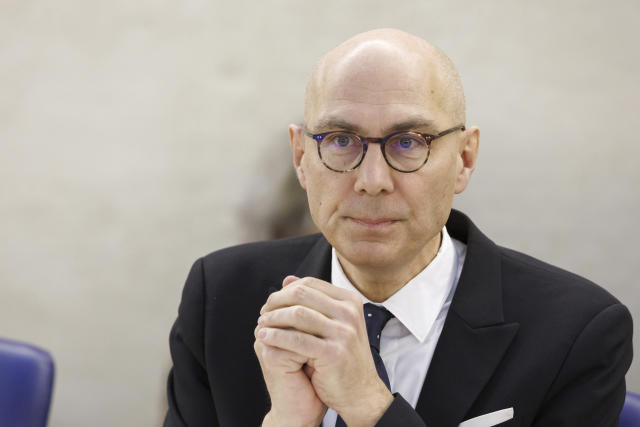
Yet Another Top Russian General ‘Liquidated’ By Ukrainian Missile Strike
Kremlin/Wikimedia CommonsRussia has lost another yet another general thanks to its grinding war against Ukraine, the latest in a string of casualties caused at least in part by President Vladimir Putin’s controversial tactic of sending senior military officials to its frontlines in an attempt to boost flagging morale. Lieutenant General Oleg Yuryevich Tsokov, who was previously sanctioned by the EU for his “participation in Russia’s war of aggression against Ukraine,” was reportedly killed in an
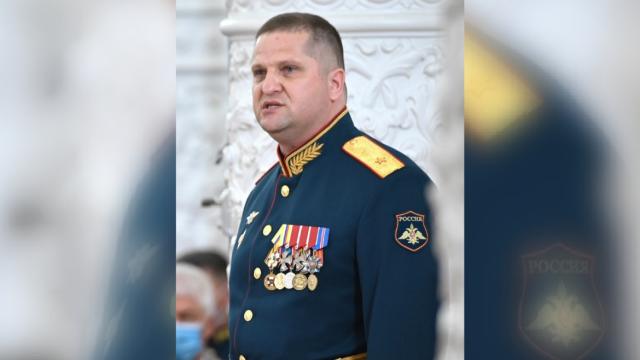
Anton Gerashchenko, advisor to the Minister of Internal Affairs of Ukraine, confirmed the news on Twitter Tuesday.
“Since August 2022 he commanded the 144th motorized rifle division of the 20th combined arms army of the Russian Federation,” Gerashchenko wrote. “He received the rank of lieutenant general in 2023. In addition to the full-scale invasion of Ukraine, he took part in two Chechen wars and the war in Syria.”
“Colleagues speak of Tsokov as a competent officer and a good commander,” the channel posted in Russian.
“Locals report that almost nothing is left of the hotel,” the channel posted in Ukrainian. “Now, fast and heavy equipment are working on the site, dismantling the debris. The territory is surrounded. No one is missed.”
Tsokov was reportedly injured back in September by a Ukrainian artillery attack on his headquarters in Luhansk. He was evacuated to St. Petersburg and treated for a leg wound, but it’s unclear when he returned to Ukraine.
‘Missing witness’ who accuses Biden of China corruption charged with being China agent
Gal Luft charged in absentia with arms trafficking, violations of sanctions on Iran and making false statements
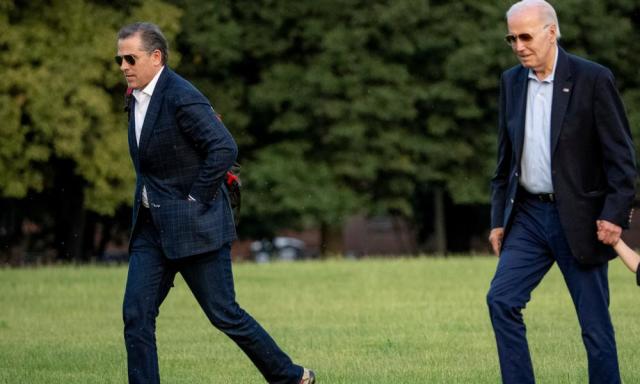
“He subverted foreign agent registration laws in the United States to seek to promote Chinese policies by acting through a former high-ranking US government official; he acted as a broker in deals for dangerous weapons and Iranian oil; and he told multiple lies about his crimes to law enforcement.”
News of the charges seemed guaranteed to infuriate Republicans in Congress seeking to use Hunter Biden’s troubled personal life and business dealings in attacks on his father, potentially including attempts to bring about impeachment proceedings.
“I’m not a Republican,” Luft said. “I’m not a Democrat. I have no political motive or agenda … I did it out of deep concern that if the Bidens were to come to power, the country would be facing the same traumatic Russia collusion scandal [the investigation of Russian election interference and links between Donald Trump and Moscow] only this time with China.”
Saying he “warned the [US] government about potential risk to the integrity of the 2020 elections”, Luft added: “Ask yourself, who is the real criminal in this story?”
He skipped bail, he said, “because I did not believe I will receive a fair trial in a New York court”.
The former official and an alleged Chinese co-conspirator were not named.
Luft is also alleged to have “conspired … to broker illicit arms transactions with, among others, certain Chinese individuals and entities”; to have conspired with a Chinese energy company “to broker deals for Iranian oil – which he directed an associate to refer to as ‘Brazilian’ oil in an effort to … evade sanctions”; and to have made “multiple false statements” to law enforcement.
The SDNY listed maximum jail sentences for the charges against Luft, ranging from five years for conspiracy to violate the Foreign Agents Registration Act to 20 years for arms trafficking offenses and sanctions violations.
Noting Luft’s “fugitive” status, the SDNY asked people with information about his whereabouts to contact the FBI or the nearest US embassy or consulate.
Haley says Biden ‘made Putin’s day’ with resistance to Ukraine’s NATO bid
Republican presidential candidate Nikki Haley criticized President Biden’s resistance to NATO membership for Ukraine Tuesday, suggesting that the move benefits Russian President Vladimir Putin. “I mean, I think he just made Putin’s day,” she said in an interview with Fox News. “Look at what is happening. They are missing the exact strategy that could end…
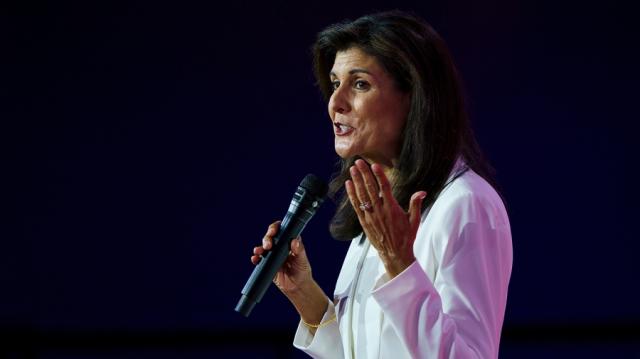
Republican presidential candidate Nikki Haley criticized President Biden’s resistance to NATO membership for Ukraine Tuesday, suggesting that the move benefits Russian President Vladimir Putin.
“I mean, I think he just made Putin’s day,” she said in an interview with Fox News. “Look at what is happening. They are missing the exact strategy that could end this war.”
“If you just look at NATO, and I know because I dealt with them at the United Nations, they can get weak in the knees and you have to stiffen their spine. I had to do it many times at the UN,” Haley, who previously served as the U.S. ambassador to the United Nations, added. “The key is there is no reason Ukraine should not be part of NATO.”
As Biden attends the NATO summit in Lithuania this week, he and his administration have made clear that Ukrainian membership in the alliance is still far off.
“This means that a window of opportunity is being left to bargain Ukraine’s membership in NATO in negotiations with Russia,” Zelensky said. “And for Russia, this means motivation to continue its terror.”
“It’s unprecedented and absurd when timeframe is not set neither for the invitation nor for Ukraine’s membership, while at the same time vague wording about ‘conditions’ is added even for inviting Ukraine,” the Ukrainian president added.
How African migrants survived racial attacks in Tunisia
A group of teenagers held "a knife to my throat", a woman from Ivory Coast tells the BBC.
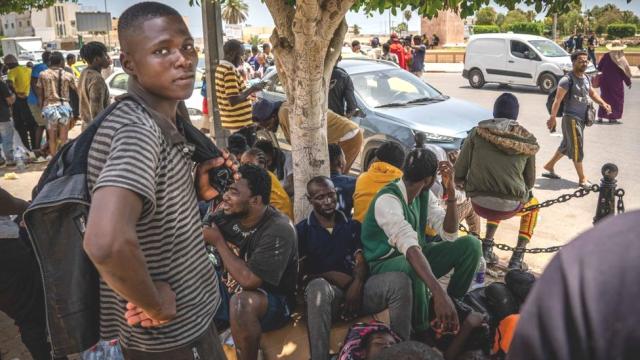
Standing destitute in the street with her one-year old baby strapped to her back, Louise Fallone describes the moment when masked attackers broke into her home in the Tunisian coastal city of Sfax and chased her out.
"At 2am, Tunisian teenagers attacked... They threw stones at us and held a knife to my throat.
"I took my baby and fled without clothes. My Tunisian neighbour threw a blanket over me as I ran.
"They took my money and broke everything we had."
Ms Fallone arrived from Ivory Coast about a year ago in search of better economic opportunities, and works in a coffee shop.
She was attacked in a wave of xenophobic violence, which happened about a week ago after the fatal stabbing of a 41-year-old local man during an altercation with several migrants from sub-Saharan Africa.
As the BBC team drove into the city, with the temperature gauge in the car reading 40C (104F), the first thing we saw were dozens of migrants standing alongside the dusty road holding signs saying "peace".
Horns sounded in support as locals drove past the encampment. And we saw locals giving out bread and water.
But there was no doubt that hostility to these migrants remained.
Videos of the attack have been widely shared. One shows a masked perpetrator screaming that "black Africans are a threat to us and our women" and then inciting people to assault the migrants.
In another, a man shouts: "We must kick all these migrants out. We don't want them living here."
In order to understand why this city had erupted into such violence, we spent the night with the hundreds of migrants, sleeping on the concrete.
Dozens were carrying visible injuries which they told us were from the attacks of 4 July. One woman, suffering heat stroke, lay nearly unconscious.
A total of 25 people, including children, needed treatment in hospital on the night of the attack. One migrant says his seven-year-old brother, who had both his legs broken, was among them.
Footage from that night shows a presence of police, but a seeming lack of intervention by them.
Despite numerous requests for comment, the police would not speak to us.
However, the very next morning, the authorities did respond, by forcibly removing more than 100 migrants from the city and driving them to the Tunisian-Libyan border.
A further 1,000 have since been removed from the city and taken to both the Libyan and Algerian borders, local Tunisian officials have been quoted as saying.
Videos filmed by the migrants at the Tunisian-Libyan border and sent to campaign group Human Rights Watch (HRW) show several people with open wounds and deep lacerations.
They claim to have been beaten by the authorities.
The border authorities declined to comment regarding the allegations.
However, Tunisia's President Kais Saied on Saturday rejected all claims of mistreatment against migrants and said they were receiving aid within what he called "our values".
Relative peace has now returned to the streets of Sfax. But in the city's numerous coffee shops, the attacks are still all anyone can talk about.
Local shopkeeper and activist Miriam Bribri says she is outraged but not surprised by the violence which took place last week.
"There was a wave of racist videos on social media. I was seeing such disgusting posts. So I was already worried such an upsurge of anger could only result in violence."
She blames President Said too. Earlier this year he made highly inflammatory comments, alleging that "hordes of sub-Saharan African migrants" were bringing "violence and crime" into the country.
"What was shocking was finding myself in the minority, defending basic principles against violence and racism," says Ms Bribri
One specific Facebook account, criticised for promoting the violence in Sfax last week, was Sayeb-Etrottoir, meaning "Clear the Sidewalks".
Just days before the attacks, the page posted materials advocating that Sfax must be "saved" from the migrants.
The group's administrator and prominent influencer, Zied Mallouli, vehemently rejects claims that the posts fuelled violence.
In an interview with the BBC, he said he could only speculate as to why people took to the streets that night.
"For them it was a matter of liberation. They think migrants have taken their homes and will settle here."
However, he was clear on what he thinks should happen next.
"The immediate solution is for the authorities to gather all the people in downtown Sfax and deport them and put them in a camp," Mr Mallouli said.
In the centre of Sfax, close to a small rubbish dump, about 300 migrants have set up camp since being driven from their homes.
With only cardboard to lay on, and a few trees under which to seek shade from the scorching sun, the stench of rotting food from the dump surrounds them.
"I've spent four days here with my family because we don't have any other place to stay. I'm just so tired. I feel like giving up," says Miriam, a mother of two from Sierra Leone.
She adds that she is almost at the point of seeking a loan to return, although this is nearly impossible.
Enduring sweltering temperatures, and with very little shade on the streets, they are entirely dependent on hand outs from local residents.
"I saw that these people were hungry and sleeping in the open," says one local resident. "So with my friends, we decided to make sandwiches. Yesterday we also brought water and yogurt. All for free, in God's grace."
Another, a taxi driver, says he and his wife have begun to host one mother and daughter after last week's attacks.
"I feel sorry for the migrants and my city. So I decided to host a family. I provide them with shelter and the food my wife cooks. The Tunisian authorities should offer them all legal status," the taxi driver added.
In the current climate, the chances of that happening seem close to impossible.
Stuck in limbo, neither the authorities, nor the migrants seem to be any closer to a solution - or a final destination.
In Ukraine, civilians train in survival skills to cope with dangers from Russia’s war
In a cramped municipal building in a residential area of the Ukrainian capital, a group of people take turns training to shoot using a replica of a machine gun with the help of a weapons training simulator relying on virtual reality. The nearly 20 participants — all of them civilians and most of them women — have never held a weapon before. With Russia’s war on Ukraine now in its 17th month, the Kyiv City Administration has opened up training for civilians who want to learn survival skills, including how to shoot, provide first aid and recognize land mines.
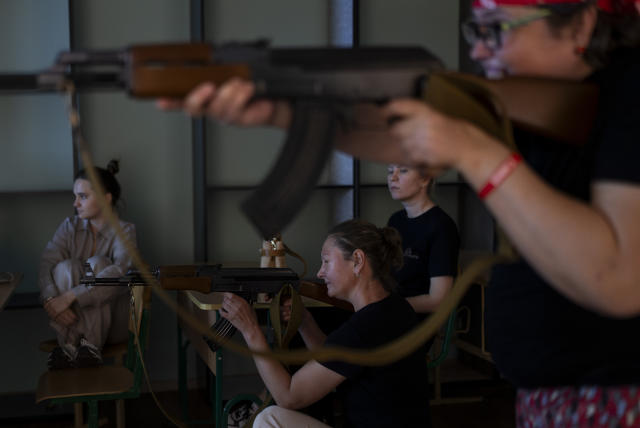
KYIV, Ukraine (AP) — In a cramped municipal building in a residential area of the Ukrainian capital, a group of people take turns training to shoot using a replica of a machine gun with the help of a weapons training simulator relying on virtual reality.
The nearly 20 participants — all of them civilians and most of them women — have never held a weapon before.
In a dark room with tightly closed blinds, the unreal poof-poof sounds of the replica weapons are heard. People enthusiastically ask the instructors how to hold their weapons properly and ask to try one more time.
“I am more than 45 years old. As soon as the opportunity arose, I decided that I needed to refresh some skills and learn something new,” said Kyiv resident Lada Bondarenko. She was especially impressed by the instructor’s lecture on possible land mine threats.
It was a reminder that the Kyiv region, although not currently on the front lines of the war, is still at major risk because of mines left behind by the Russians who briefly occupied areas on the outskirts of the capital in the early days of the war.
While the fighting on the front lines is now largely in stalemate, indiscriminate Russian missile attacks continue to hit residential areas, wreaking havoc and causing almost daily casualties across the country.
Several days after the registration on the city's website was opened, more than 2,000 people had signed up for the training, around 70% of them women, said the deputy director for Kyiv’s municipal security, Mykhailo Shcherbyna.
“The main goal is for people to learn how to survive and how to respond to these military threats that exist,” he explained.
According to Shcherbyna, by educating people, local authorities try to prevent more casualties in the future. “The war continues, and we don’t know what the next threats will be.”
In his opinion, one of the reasons why most of those who signed up for the training are women is because a large number of men are already at the front. Also, many women come so that these skills will help them protect not only themselves but their children.
But men, too, attend with the protection of their children in mind.
“I came to be able to explain to my children that there are mines that can tear off arms, legs and take life,” said Vitalii Sumin, aged 38.
His house is located in nearby Irpin, an area in the northwestern outskirts of the capital where fierce battles took place last spring. When the Russians retreated last March, many land mines were left in the area, which now could be deadly dangerous, hidden in the grass.
Vitalii’s wife couldn’t attend the training in person, so he transmitted it online while she stayed at home with their 2-year-old child. Next time, he plans to bring the whole family to the training, especially his 13-year-old, he said.
According to the Ministry of Internal Affairs, around 174,000 square miles (451,000 square kilometers) in Ukraine are potentially contaminated with mines, about the size of the U.S. state of Florida.
On Tuesday, local authorities held the first such training for civilians. Previously, they mostly trained people who worked in municipal services. In the early days of the war, they taught people basic skills so they could start fighting immediately.
According to Shcherbyna, the deputy chief of municipal security, last year they taught about 15,000 people, and approximately 3,000 of them joined the army.
Instructor Yevhen Naumov said that Russia’s invasion showed that the threat from Ukraine’s biggest neighbor would not disappear easily. In his opinion, by attending this training, people were preparing for the possibility that this war could last for a long time.
___
Associated Press writer Illia Novikov contributed to this report.
___
UN human rights body takes up concerns about Quran burnings in Europe
The U.N. human rights chief used a special debate on Tuesday about burnings of the Quran in Sweden and other European countries to tread a fine line between freedom of expression and respect for religious beliefs, while broadening his call for respect of “all others” including migrants, LGBTQI+ people, and women and girls who wear headscarves. Volker Türk, speaking to the Human Rights Council, took on hatred and discrimination that fans violence amid growing concerns about “manufactured” shows o
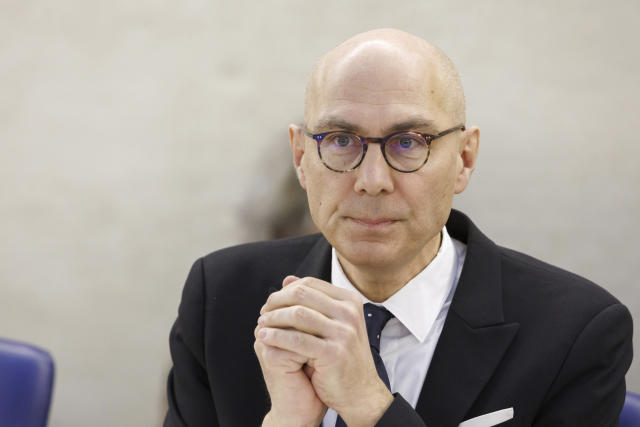
GENEVA (AP) — The U.N. human rights chief used a special debate on Tuesday about burnings of the Quran in Sweden and other European countries to tread a fine line between freedom of expression and respect for religious beliefs, while broadening his call for respect of “all others” including migrants, LGBTQI+ people, and women and girls who wear headscarves.
The debate, coming during the council's summer session, shaped up largely along the lines of Western countries that condemned such intolerance but affirmed the right to freedom of expression, and predominantly Muslim countries who want governments to strengthen their legal arsenals to ban expressions of religious intolerance and hatred that could lead to violence, discrimination or hostility.
“We’d like to stress that freedom of expression is an ethical value that should spread to peaceful coexistence rather than causing a clash of civilizations,” said Prince Faisal bin Farhan, the foreign minister of Saudi Arabia, in a video statement. “We should spread values of tolerance.”
Türk denounced the Quran burnings in Europe among recent incidents that “appear to have been manufactured to express contempt and inflame anger, to drive wedges between people and to provoke transforming differences of perspective into hatred and perhaps violence.”
Beyond matters of legislation or government, he said people must show respect to “all others” and insisted that “advocacy of hatred that constitutes incitement to violence, discrimination and hostility should be prohibited in every state.”
Türk cautioned that hate speech of all kinds was on the rise — even if it isn't always deemed to incite violence.
"Dehumanizing women and denying their equality with men; verbally abusing Muslim women and girls who wear a headscarf; sneering at people with disabilities; making false claims that migrants or people of specific ethnicities are more likely to engage in crime or smearing LGBTQ+ people — all such hate speech is similar in that it stems from the baseline notion that some people are less deserving of respect as human beings,” he said.
Pakistan and Palestine led a push for a council resolution that, among other things, called on countries to take steps to “prevent and prosecute acts and advocacy of religious hatred that constitute incitement to discrimination, hostility or violence.”
The United States said it wouldn't support the resolution amid concerns that it could trample on a fundamental right to freedom of expression.
“We know from experience that attempting to ban such expression actually usually amplifies it further by bringing even more attention to it and often serves as a catalyst for further hatred," said Rashad Hussain, the U.S. ambassador-at-large for international religious freedom, expressing U.S. opposition to so-called “blasphemy" laws.
“Such laws also fail to address the underlying causes of bigotry,” he said, calling instead for efforts to "reinvigorate education and interfaith intercultural dialogue to confront hate speech.”
A vote was expected Wednesday morning.
0 Likes
